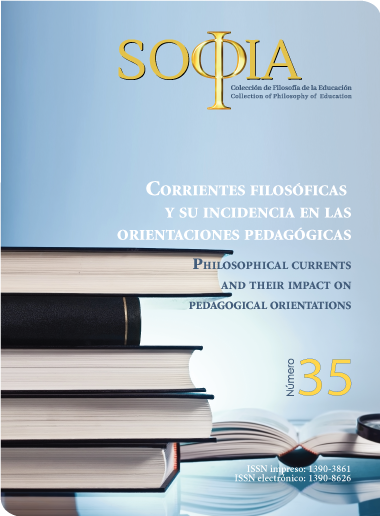Hermeneutics and technology as a salvific dialogue for current pedagogy
Main Article Content
Abstract
Article Details

This work is licensed under a Creative Commons Attribution-NonCommercial-ShareAlike 4.0 International License.
Authorship: The list of authors signing must include only those people who have contributed intellectually to the development of the work. Collaboration in the collection of data is not, by itself, a sufficient criterion of authorship. "Sophia" declines any responsibility for possible conflicts arising from the authorship of the works that are published.
Copyright: The Salesian Polytechnic University preserves the copyrights of the published articles, and favors and allows their reuse under the Creative Commons Attribution-NonCommercial-ShareAlike 3.0 Ecuador license. They may be copied, used, disseminated, transmitted and publicly displayed, provided that: i) the authorship and the original source of their publication (journal, editorial and work URL) are cited; (Ii) are not used for commercial purposes; Iii) mention the existence and specifications of this license.
References
Amengual, A. (2001). “Tecnología y Pedagogía”. Calidad en la Educación, 15, 1-9. http://dx.doi.org/10.31619/caledu.n15.457
Ávila, L. (2016). “El Dasein y la formación. Una mirada en clave heideggeriana”, pp. 93-107. En La formación y la constitución del ser. Ed. Universidad Distrital Francisco José de Caldas.
Ballén, R. (2010). “La pedagogía en los Diálogos de Platón”. Revista Diálogos de Saberes, 33, 35-54. https://revistas.unilibre.edu.co/index.php/dialogos/article/view/2001/1524
Bedoya, C. (2014). “Ruina y recuperación de la vida: La hermenéutica en el joven Heidegger”. Universitas Philosophica, 31(62), 95-112. https://www.redalyc.org/pdf/4095/409533957005.pdf
Berciano, M. (1992). “¿Qué es realmente el «Dasein» en la filosofía de Heidegger?”. Thémata, 10, 435-450. https://institucional.us.es/revistas/themata/10/04%20berciano.pdf
De la Maza, L. (2005). “Fundamentos de la filosofía hermenéutica: Heidegger y Gadamer”. Teología y Vida, XLVI, 122-138. https://scielo.conicyt.cl/pdf/tv/v46n1-2/art06.pdf
García-Córdoba, F. (2010). “La tecnología. Su conceptuación y algunas reflexiones con respecto a sus efectos”. Metodología de la Ciencia. Revista de la Asociación Mexicana de Metodología de la Ciencia y de la Investigación, 2(1), 13-28. http://www.ammci.org.mx/revista/pdf/Numero2/2art.pdf
Gómez, G. (2008). “El uso de la tecnología de la información y la comunicación y el diseño curricular”. Revista Educación, 32(1), 77-97. https://doi.org/10.15517/revedu.v32i1.525
Gutiérrez, C. (1984). “Hermenéutica: ¿verdad contra método?”. Cuadernos de Filosofía y Letras, vol. VII (1-2).
Heidegger, M (1983). Ciencia y Técnica. Santiago: Universitaria.
Heidegger, M. (2002). Ser y Tiempo. Santiago: Universitaria.
Kant, I. (1803). Pedagogía. Escuela de Filosofía Universidad ARCIS. https://www.philosophia.cl/biblioteca/Kant/Pedagogia.pdf
Ledesma A. (2021). “El método hermenéutico-fenomenológico de Martin Heidegger y la posibilidad de una investigación filosófica independiente”. Studia Heideggeriana, vol. X, 245-262. 10.46605/sh.vol10.2021.115
León, E. (2009). “El giro hermenéutico de la fenomenológica en Martín Heidegger”. Polis, 8(22), 267-283. https://www.scielo.cl/pdf/polis/v8n22/art16.pdf
Luna Alcoba, M. (2003). Ensayos de Tecnodicea sobre la bondad de la ciencia, la libertad del mercado y el origen de la máquina. Google Libros.
Platón (2000). Diálogos II. Madrid: Gredos.
Platón (2000). Diálogos IV. Madrid: Gredos.
Polo, M. A. (2001). “La hermenéutica ontológica de Gianni Vattimo”. Escritura y Pensamiento, año IV, W 7, 75-97. https://revistasinvestigacion.unmsm.edu.pe/index.php/letras/article/view/7542/6561
Prendes, M. P. (2018). “La Tecnología Educativa en la Pedagogía del siglo XXI: una visión en 3D”. Revista Interuniversitaria de Investigación en Tecnología Educativa (RIITE), 4, 6-16. http://dx.doi.org/10.6018/riite/2018/335131
Rivero Weber, P. (2001). “Apuntes para la comprensión de la hermenéutica en Heidegger”. Theoría, n. 11-12. https://doi.org/10.22201/ffyl.16656415p.2001.11-12.271
Salomón Amaya, U. (2015). “La esencia de la Técnica (Das Ge-stell) como un habitar (Whonen)”. Teoría y Praxis, 27, pp. 49-68. http://rd.udb.edu.sv:8080/jspui/bitstream/11715/895/1/3%20la%20esencia%20de%20la%20tecnica.pdf
Ulloa, I. (2018). Heidegger: El pensar calculante por sobre el pensar meditativo. [Informe final de Seminario de Grado]. Universidad de Chile. 44 pp. https://repositorio.uchile.cl/bitstream/handle/2250/148093/Heidegger-el-pensar-calculante-por-sobre-el-pensar-meditativo.pdf?sequence=1&isAllowed=y
Valiente, A. (2015). Análisis de la propuesta educativa de Platón como fundamento para la construcción de un Estado justo. [Monografía para optar por el título de Filósofa]. Universidad de Cartagena. 59 pp. https://repositorio.unicartagena.edu.co/bitstream/handle/11227/2447/monografia%20pdf.pdf;jsessionid=815573E32E1C04E712C6D78BF4263B83?sequence=3

